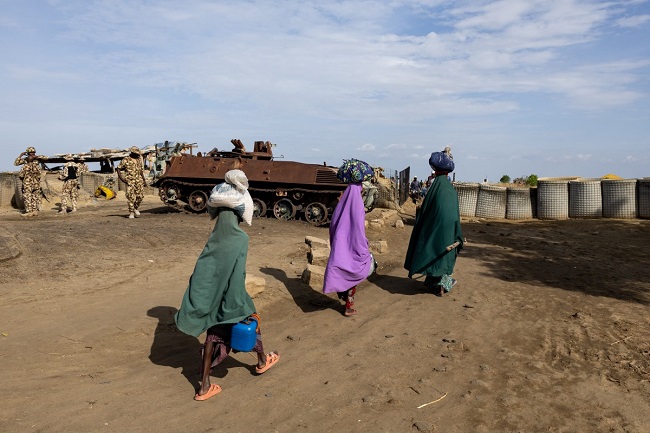From the air, Monguno resembles a fortress—its perimeter carved by deep trenches that have helped shield the garrison town in Nigeria’s Borno State from a resurgence of jihadist violence.
Despite a recent wave of attacks on military bases across northeastern Nigeria, Monguno has remained largely secure. However, fighters from Islamic State West Africa Province (ISWAP) and Boko Haram have overrun or attacked at least a dozen military sites in Borno and neighbouring Yobe State this year.
Monguno itself briefly fell to jihadists in 2015. Since 2019, the Nigerian military has consolidated its presence into fortified “supercamps”, abandoning smaller bases and rural outposts—a move critics say has ceded control of remote areas to insurgents.
IED attacks have surged. The United Nations Mine Action Service reported 418 civilian casualties from explosive devices in 2024—double the toll from the previous year. Soldiers now comb the roads leading into Monguno daily with metal detectors to prevent deadly ambushes.
“We clear this 10-kilometre route every day,” said Major Oluwafemi Seyingbo, head of a demining unit near Lake Chad. “Explosives are often planted overnight.”
Checkpoints are critical to the town’s defence. Twelve of them ring Monguno, each manned by Nigerian troops. Major Friday Feekwe, who commands one, said jihadists launched two major assaults in March, bringing heavy weapons. His checkpoint now includes a fortified tower and a 12.7mm machine gun.
The army’s presence, along with the Multinational Joint Task Force (MNJTF)—comprising troops from Nigeria, Chad, Cameroon, and Benin—has turned Monguno into a haven for displaced people. The MNJTF’s Sector 3 base, located in the town, anchors its Nigerian operations.
Residents like Umar Bullam have returned to safety after fleeing jihadist raids. “Boko Haram looted my land and fertiliser,” the 30-year-old said. “But here, I feel secure.”
Hauwa Garba, 35, fled to Monguno from southern Niger two months ago. “They came at night,” she said of the jihadists. “They killed the adults and kidnapped the children.” She still has no news of her daughter Aisha, who was 15 when she was taken.
Borno State alone accounts for nearly half of Nigeria’s 3.6 million displaced persons. Experts warn that despite military fortifications and aerial surveillance, Nigeria still struggles to confront jihadists entrenched in remote territories.
“The government has prevented major urban takeovers like those in 2013 and 2016,” said Vincent Foucher of France’s CNRS. “But it remains unable to neutralise jihadist groups in rural strongholds.”
Worryingly, militants are enhancing their capabilities. On 24 December, ISWAP used drones to strike Wajiroko military base—the first such attack in Nigeria. According to the Institute for Security Studies (ISS Africa), the use of drones could transform even fortified outposts like Monguno into vulnerable targets unless urgent action is taken.



